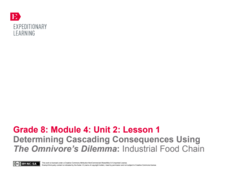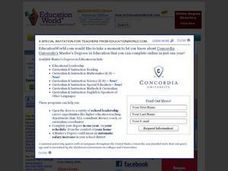American Press Institute
In the Newsroom: The Fairness Formula
Reporting the news is easy, right? Think again! Show young scholars the difficult choices journalists make every day through a lesson that includes reading, writing, and discussion elements. Individuals compare the language and sources...
EngageNY
Analyzing the Author’s Perspective: “The Shakespeare Shakedown”
Simon Schama's article "The Shakespeare Shakedown" allows young writers to see how authors respond to conflicting viewpoints. Class members participate in discussion appointments with five peers to explore the author's point of view.
EngageNY
The Authorship of Shakespeare: “The Shakespeare Shakedown”
Pupils conduct a close reading of "The Shakespeare Shakedown" by Simon Schama, and identify evidence the author uses to support his claims. Finally, they discuss and answer text-dependent questions before completing a Quick Write about...
EngageNY
Launching the Module: The Universal Appeal of Shakespeare, Part 1
Class members participate in a gallery walk, viewing images of Shakespeare and his plays. Additionally, pupils complete a T-chart to consider the advantages and disadvantages of learning about Shakespeare with images and text.
EngageNY
Mid-Unit Assessment: Analyzing an Author’s Argument and Text Structure
William Shakespeare: a writer, a poet, a fake? For their mid-unit assessments, scholars read an excerpt from the article "The Top Ten Reasons Shakespeare Did Not Write Shakespeare" by Keir Cutler. Next, they analyze the author's argument...
EngageNY
Determining Cascading Consequences Using The Omnivore’s Dilemma: Industrial Food Chain
Which of Michael Pollan's four food chains from his book The Omnivore's Dilemma would best feed everyone in the United States? Using a thought-provoking resource, scholars learn how to create a Cascading Consequences chart to answer the...
EngageNY
Local Sustainable Food Chain: Determining Cascading Consequences Using The Omnivore’s Dilemma
What are the consequences of the local, sustainable food chain? Research teams explore the question as they review Michael Pollan's The Omnivore's Dilemma. The teams complete Cascading Consequences charts and then choose research topics...
ReadWriteThink
Captioning the Civil Rights Movement: Reading the Images, Writing the Words
Scholars boost their knowledge of the Civil Rights Movement with a lesson plan that challenges writers, readers, and historians to analyze primary sources and caption their observations. By way of reading, writing, discussion,...
ReadWriteThink
"Three Stones Back": Using Informational Text to Enhance Understanding of Ball Don't Lie
"Three Stones Back," a passage from Matt de la Pena's best-seller, Ball Don't Lie, allows readers to practice their close reading skills as they compare the passage to an information text about wealth inequality.
EngageNY
Close Reading: Paragraph 4 of “Refugee and Immigrant Children: A Comparison”
Why is reading a text closely a helpful skill? Using the 13th of 20 lessons from the Grade 8 ELA Module 1, Unit 2 series, scholars continue reading the informational text "Refugee and Immigrant Children: A Comparison." They work with...
EngageNY
Analyzing Text Structure: “The Shakespeare Shakedown”
Pupils continue reading and discussing Simon Schama's article "The Shakespeare Shakedown." They work together to analyze the article's paragraph structure, completing a note-catcher worksheet.
K20 LEARN
Unlocking Answers: Keys to Great Research
Successful searches for information require more than just a device with Google access. Young researchers learn how to use keywords and hashtags, as well as how to evaluate sources and how to paraphrase without plagiarizing in a fun...
Curated OER
Basil Heatter, "The Long Night of the Little Boats"
“It was a miracle.” Basil Heatter’s “The Long Night of the Little Boats,” which details the miraculous rescue of the British army from the shores of Dunkirk in 1940, is featured in a series of exercises that ask class members to read,...
Curated OER
Practice Makes Perfect: Citing Textual Evidence
Strategies, lesson plans, and ideas to help pupils locate and cite textual evidence.
Curated OER
Chasing Lincoln's Killer: A Novel Study
James Swanson's novel, Chasing Lincoln's Killer, provides an engaging unit of study for all readers.
Curated OER
William Apess and the Mashpee "Revolt" of 1833
Prompt your class with the following question: What was the status of American Indians in Massachusetts during Jackson's presidency? To answer this question, class members will read a series of primary source documents (attached),...
Curated OER
Note Taking By Crayon
Skim a brief biography of Amelia Earhart with your class, and then assign groups of researchers one of four topics listed: Amelia's family life, important airplane flights during Amelia's life, turning points in Amelia's life, and...
Indiana Department of Education
Indiana K-12 Educators’ Resource Toolkit
Imagine a tool that magically engages readers in the classroom. A handbook for Indiana educators doesn't guarantee success, but it does offer a variety of strategies for teachers to try. The handbook opens with research-based theory...
Other popular searches
- Nonfiction Book Reports
- Nonfiction Text
- Summarizing Nonfiction
- Fiction and Nonfiction
- Fiction or Nonfiction
- Nonfiction Reading
- Nonfiction Text Features
- Nonfiction Text Structure
- Nonfiction Books
- Nonfiction Reading Skills
- Nonfiction Writing
- Nonfiction Literature



















